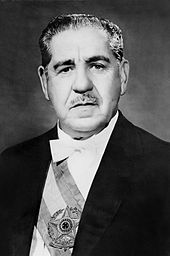Artur da Costa e Silva
Artur da Costa e Silva (born October 3, 1899 , Taquari , Rio Grande do Sul ; † December 17, 1969 , Rio de Janeiro ) was President of Brazil during the military dictatorship .
Life
Artur da Costa e Silva received military training in the USA and Brazil . In 1922 he was involved in a revolt against the government of Epitácio da Silva Pessoa , during which he was arrested. He later fell under an amnesty; In 1932 he fought the revolution in São Paulo .
Between 1950 and 1952 he was a military attaché in the Brazilian embassy in Argentina . In 1961 he was promoted to general and since then has commanded the fourth army in Recife ( Pernambuco ). In 1962 he was dismissed from this post because he had acted with too brutality against student protests . In 1964, he was among the generals who ousted President João Goulart . He later served as Minister of War in the government of Humberto Castelo Branco .
At the end of Humberto Castelo Branco's tenure, Artur da Costa e Silva was the only candidate to succeed him and was elected President on October 3, 1966. After Costa e Silva restricted civil rights in 1967, the country was shaken by a wave of student protests. By the Ato Institucional 5 (Institutional Act No. 5, commonly referred to as AI-5 ) of December 13, 1968, Costa e Silva switched off the parliament; henceforth the president could govern by decree . The remaining civil rights were revoked. The door and gate were open to persecution of the opposition.
Since 1969 a certain liberalization has been visible in Costa e Silva's politics. On August 30, after Costa e Silva was admitted to hospital, the presidency was replaced by a body made up of the commanders in chief of the armed forces , a military junta made up of Aurélio de Lira Tavares , Márcio de Souza Mello and Augusto Rademaker , Aviation and naval ministers were represented in the Costa e Silva cabinet ; under the constitution, Vice-President Pedro Aleixo should have represented the president. On October 14, 1969, the office of President and Vice-President was declared vacant; Costa e Silva died two months later.
literature
- Artur da Costa e Silva , in: Internationales Biographisches Archiv 05/1970 from January 19, 1970, in the Munzinger archive ( beginning of article freely accessible)
- Fábio Koifman (Ed.): Presidentes do Brasil. Cultura Editora, São Paulo 2002, ISBN 85-293-0080-7
- Jayme Portella de Mello A Revolução eo Governo Costa e Silva. Editora Guavira, Rio de Janeiro 1979.
- Hélio Silva: Os Presidentes do Brasil 23º: Costa e Silva. Grupo de Comunicação Três, São Paulo 1983.
Web links
- Arthur da Costa e Silva. Governo Federal, Biblioteca da Presidência da República (Portuguese)
- Literature by and about Artur da Costa e Silva in the WorldCat bibliographic database
Individual evidence
- ↑ a b c Arthur da Costa e Silva. Biography. Governo Federal, Biblioteca da Presidência da República. Retrieved May 22, 2017 (Portuguese).
- ^ Else RP Vieira: Growing Agency. The Laboratories of Political Translation . Maria Tymoczko (ed.): Translation, resistance, activism . University of Massachusetts Press, Amherst 2010, ISBN 978-1-55849-832-7 . Pp. 211-226, here pp. 216-220.
| predecessor | Office | successor |
|---|---|---|
| Humberto Castelo Branco |
President of Brazil 1967–1969 |
Márcio de Souza Mello |
| Antônio Ferreira de Oliveira Brito |
Minister of Mines and Energy April 4, 1964 to April 17, 1964 |
Mauro Thibau |
| personal data | |
|---|---|
| SURNAME | Silva, Artur da Costa e |
| ALTERNATIVE NAMES | Costa e Silva, Arthur there |
| BRIEF DESCRIPTION | Brazilian politician, President of Brazil during the military dictatorship |
| DATE OF BIRTH | October 3, 1899 |
| PLACE OF BIRTH | Taquari , Rio Grande do Sul |
| DATE OF DEATH | 17th December 1969 |
| Place of death | Rio de Janeiro |
